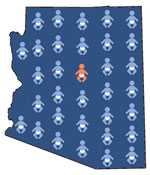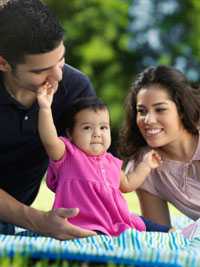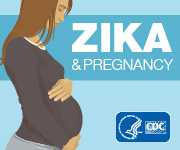Birth Defects Tracking in Arizona
Arizona Birth Defects Monitoring Program

1 in 33 babies born in Arizona has a major birth defect.
The Arizona Birth Defects Monitoring Program (ABDMP) is essential for understanding the impact of birth defects in the state. The program provides a voice for babies with birth defects, seeking to speak where they might not otherwise be heard. ABDMP tracks babies born with birth defects in Arizona and empowers families of babies with birth defects to obtain the services they need.
Common. Costly. Critical.
- Since its beginning, ABDMP has identified nearly 39,000 babies born with a birth defect in Arizona.
- Birth defects are costly – hospital costs for the treatment of birth defects are more than $2.5 billion each year in the United States.
- Babies born with a birth defect are more likely to die before their first birthday, compared to babies born without a birth defect.

About the Program
The ABDMP was created in 1988. The program gathers basic information about the babies born in Arizona with specific birth defects each year and determines whether the needs of these babies are being met. The ABDMP also works with national, state, and local programs to assist with birth defects education, awareness and prevention efforts. One of 14 birth defects programs that receive a grant funded by CDC’s National Center on Birth Defects and Developmental Disabilities, the ABDMP monitors more than 85,000 babies that are born in Arizona each year.
ABDMP works to:
- Track 33 categories of birth defects
- Review data to identify trends over time, learn more about birth defects, and discover ways to prevent them
- Promote prevention messages to reduce the number of babies and families affected by birth defects
- Assist families in getting the care they need for a baby with a birth defect
- Provide education and outreach for Arizona’s large Native American and Hispanic populations
Program in Action
- Tracks birth defects: Since 1988, ABDMP has identified nearly 39,000 babies born with a birth defect in Arizona. The program uses its data to ensure these families receive appropriate care.
- Partners with healthcare providers: ABDMP works with health care providers to discuss ways to improve care and help children with birth defects have easier access to care.
- Refers to services: ABDMP works directly with families to ensure they are receiving appropriate services. ABDMP also works with partner programs to track the number of children and families referred to services. In 2010, over 40% of Arizona babies with birth defects and their families received comprehensive care and services through the Arizona Department of Health’s Newborn Intensive Care Program. This program provides home visits by nurses to ensure care needs are met and that families have support services.
- Promotes folic acid: Folic acid is a B vitamin. If a woman has enough folic acid before and during early pregnancy, it can help prevent major birth defects of the brain and spine. ABDMP works closely with the Arizona Department of Health Services (ADHS) Bureau of Nutrition and Physical Activity to promote folic acid awareness and intake. ADHS has an active folic acid distribution program, PowerMeA2Z, which ABDMP is able to highlight and promote at local events.
Community Outreach
Arizona has a large American Indian population. In order to serve Arizona’s population, ABDMP has hosted two forums geared toward improving prenatal and infant care for American Indians. One perinatal educator commented on the benefits of the “Northern Arizona American Indian Child Wellness Forum,” saying:
“I have lived in Flagstaff (AZ) for 10 years and have worked as a nurse and provided education to Tuba City, Chinle, and many other hospitals on obstetrics topics. I have always wanted to learn more about the Navajo culture/perspective so that I could provide better culturally sensitive care and education. This has finally given me a start toward a much better understanding. Thank you!”
ABDMP is active in the community and annually supports events like the Sharing Down Syndrome Walk and the Spina Bifida Walk and Roll. At these events, ABDMP shares current birth defect trends and statistics, provides information about local resources, and engages with local families and programs.
More Information
For more information on the Arizona Birth Defects Monitoring Program, please visit their website, email ABDMP@azdhs.gov, or call (602) 542-7335.
- Page last reviewed: June 12, 2017
- Page last updated: June 20, 2017
- Content source:



 ShareCompartir
ShareCompartir